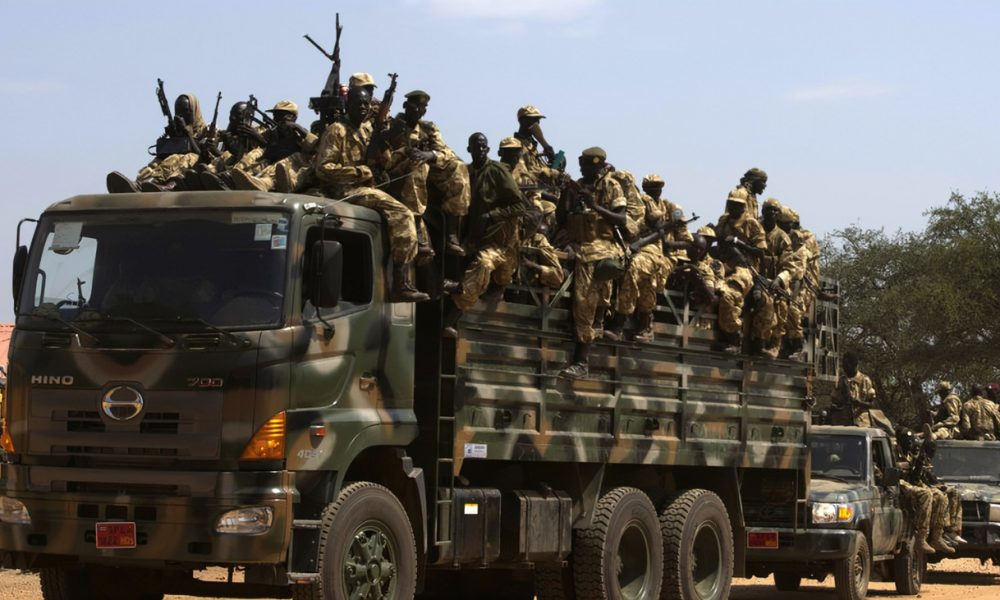By Mamer Abraham
Vice Chancellor of the University of Juba, Professor John Apuruot Akec, has decried the huge number of South Sudan army if wages were to be increased.
In his presentation at the National Economic Conference, Prof. Akec said the oversized military will have a negative impact on the wage bill and derail the national budget.
The scholar observed that the size of South Sudan army was too big compared to other armies on the continent.
He argued that South Sudan’s army, which is 414,000 doubles the size of the army of a country like Nigeria, yet the population of South Sudan is far less than that of Nigeria, with a population of 200 million.
“It’s three times the size of the army of Ethiopia and Sudan and almost four times that of Angola. It’s about eight times Uganda, and so on, for a country of 13 million,” he revealed.
Prof. Akec also highlighted that the current salaries are not competitive and motivating, as it cannot buy a daily meal or a month’s worth of food.
“Those are people who get a very low salary, but they are there. If you try to increase the salary, how much are you going to pay if you really pay them very well? he stated.
“So, we can say that the current salaries are not competitive. They are not motivating, and, you know, besides ordinary civil servants, a minister’s salary cannot buy a meal for a day, let alone for the whole month,” Prof. Akec lamented.
He continued that the allowances of the civil servants were sixteen times more than their basic salaries.
“In our case, there is a case where we found that the actual allowance was about 16%—I mean, 16 times the base pay,” he added.
According to Professor Akec, the president is supposed to receive a salary of 5,565,000 SSP, a minister 3,700,000 SSP, and a member of parliament 2,597,000 SSP, while a Vice Chancellor should receive 3,710,000 SSP.
In the army, he said a Lt. Gen. should receive 2,968,000 SSP, a captain should receive 487,000 SSP, and a private should receive 118,000 SSP.
As for the public servants, he said a grade one should receive 779,000 SSP, a grade five public servant should receive 591,000 SSP, and the lowest-paid civil servant in grade 17 should be paid 77,000 SSP.
Prof. Akec argued that unless the army’s size is reduced, it will take the lion’s share of payment in salary and wages.
“Now, in scenario one, notice that if you keep the army as it is, they will take 63% of the whole wage bill, and the wage will be very high. Did you see that 63% will go to the army?” Akec inquired.
Meanwhile, on Thursday, the spokesperson of the South Sudan People’s Defense Forces (SSPDF), Maj. Gen. Lul Ruai Koang dismissed a claim that the army had rejected salaries because the scale did not meet the current living standards.
“SSPDF leadership and command would like to categorically dismiss rumors circulating on social media alleging that its ranks and files had rejected salaries on grounds that it does not meet the prevailing conditions in the market,” Lul said in a statement.
He stated that the army was ready to receive its salaries whether or not the adjustments were made.
“The National Army would like to reiterate its readiness to receive the salaries when they are due, regardless of whether adjustments are made or not,” he added.
In July, the parliament approved the increment of the salaries of civil servants by SSP 224 billion, up from SSP 445 billion, during the second reading of the budget for the 2023–2024 financial year.
Changkuoth Bichiock, the chairperson of the specialized committee on finance, said the decision came after the committee noted that increasing the salaries of civil servants by 400 percent was not enough.
“The priority of this year’s FY2023/2024 budget is the increase in salaries and wages of our civil servants, army, and other organized forces. The 400% increment provided in the budget by the executive is not sufficient,” Changkuoth noted.
However, the 600 percent salary and wage increment were later revoked to 400 percent in the third reading after the minister for finance and planning, Bak Barnaba Chol, said his ministry could not manage to pay such a huge sum.
The budget was passed by the parliament in the third reading with an increment of 400 percent, therefore prompting the opposition MPs to walk out of the parliament dissatisfied with the decision.




